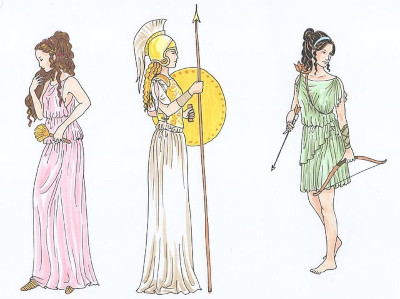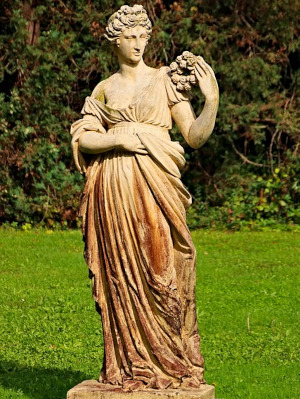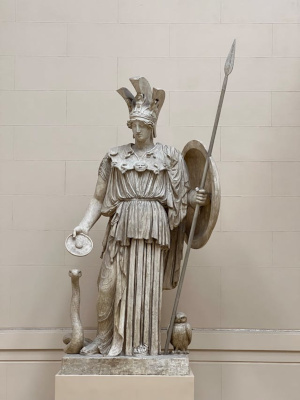Gods and goddesses stories were significant in ancient Greece, explaining everything from religious practices to the weather and giving meaning to the world people observed. This article contains ten ancient Greek goddesses.
Hestia
Hestia was known as the goddess of home and family life. Therefore, all the joy and blessings within a household were attributed to her. It is said that she taught humans the art of building houses, which is why a part of Hestia resides in every home. This is also why she is seen as the guardian and mentor of human work.
Hebe
Hebe is known as the goddess of youth. She is often seen with her father, Zeus, who takes the form of an eagle. In many paintings throughout history, Hebe is depicted holding a cup that the eagle drinks from, symbolizing the rejuvenation of youth. This iconic image of Hebe and the eagle has been popular for centuries. The eagle is believed to regain its youth by drinking from the cup.
Nemesis
Nemesis is the goddess of revenge and divine retribution. She embodies the concept of divine retribution towards those who display arrogance before the gods, known as Hubris. Her name, “she who distributes what is due,” reflects her role in maintaining balance in human affairs.
Leto
Leto was known for her role as the mother of Apollo and Artemis. One day, Zeus, the king of the gods, was captivated by Leto’s beauty and impregnated her, resulting in the birth of the twins Apollo and Artemis. Hera, Zeus’ wife, was furious, and out of jealousy, she forbade Leto from giving birth. Leto faced great difficulties as she searched for a safe place to deliver her children. Eventually, she found refuge on the island of Delos. Hera sent Tityos to abduct Leto once again. However, Leto’s son Apollo intervened and killed Tityos, protecting his mother.
Rhea
Rhea represents ease and flow, symbolizing the continuous cycle of generations and time. Her marriage to Cronus, the Titan god of time, further highlighted this concept. As a deity closely connected to motherhood and fertility, some interpret the meaning of her name to represent the flow of birth waters, milk, and menstrual blood. After marrying Cronus, they became the divine rulers of the heavens. Rhea is known for giving birth to six magnificent children, who later became the original Olympians.
Aphrodite
Aphrodite is known as the embodiment of love, beauty, and pleasure. She is adored by her followers as the compassionate one who grants eternal youth. However, those who reject her worship see her as a sinister figure, the bringer of doom and death.
Demeter
Demeter was highly regarded as the goddess of harvest and grain. Unlike other Olympian gods, she chose to live among her followers and was worshipped in temples dedicated to her. Mortals revered her for her ability to bless them with bountiful harvests and create favorable seasons for planting crops. However, when her daughter Persephone was abducted by Hades and taken to the underworld, Demeter’s sadness caused the plants to wither and die. This led to the arrival of winter whenever Persephone left for the underworld and the return of spring when she reunited with Demeter.
Artemis
Artemis was known for her dominion over hunting, the moon, virginity, childbirth, and the wilderness. Artemis was also seen as the protector of young girls until they reached marriageable age.
Hera
Hera is the goddess of marriage and childbirth. She is known for her beauty and as the queen of Olympus, ruling alongside her husband Zeus. Additionally, she is described as a jealous and passionate protector of wives.
Athena
Athena was a unique goddess loved by both gods and mortals. Unlike Ares, she fought for justice and only joined wars for self-defense. She is known for her wisdom and knowledge. The city of Athens was named after her, showcasing her immense influence over the mortal world.
Sources:
https://greekcitytimes.com/2021/03/08/top-10-ancient-greek-goddesses/



